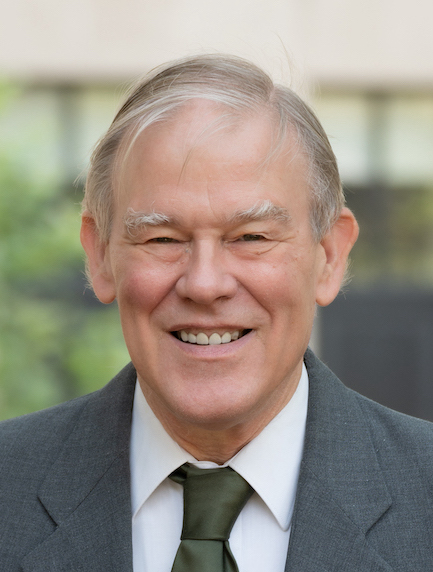Marriage and the family have historically been the bedrock of society, but for many today, encouraged by elite opinion, these things are regarded as an optional extras.
Brad Wilcox, Professor of Sociology at the University of Viriginia and Director of the National Marriage Project spoke at the Faith and Law forum on Capitol Hill on July 19 regarding the importance of marriage and the family to American happiness and flourishing. The deterioration of marriage and the family has greatly exacerbated the decline of flourishing in the United States in recent years, he believes. His new book Get Married: Why Americans Must Defy the Elites, Forge Strong Families, and Save Civilization, lays out the case for the superiority of a marriage culture.
Wilcox said that America is failing at the objectives laid out by Thomas Jefferson, which are “life, liberty, and the pursuit of happiness.” He focused on the last objective. Surveys indicate that happiness has recently been in decline. But the barriers to happiness are “not about things like race or inequality or poverty,” Wilcox believes. Instead, it is about “the closing of the American heart.” This is his way of referring to the fact that fewer and fewer younger Americans look to marriage and the family as the natural and desirable course in life.
Wilcox said that the marriage rate has come down markedly since 1970. At this point “about 1 in 3 adults in their twenties … will never marry.” This is a new situation for American society. The 2023 fertility rate was 1.62 children per woman (down from 1.67 in 2022) of child-bearing age. What this practically means “is that about one in four” Americans will never have children.
This means that there will be “a profound level of kinlessness.” An example offered was a man in his mid-thirties in the metropolitan Washington area who has “a graduate degree, owns his own home”, and is employed by a defense contractor who nonetheless testified to lack of purpose and satisfaction in life. He suffered from “loneliness, sadness, and … anomie.” Wilcox conceded that married people can be unhappy, and unmarried people can be flourishing, but overall, he believes, married life is more likely to be happy. He pointed to the research of Sam Peltzman of the University of Chicago’s Booth School of Business showing that marriage may be the most important factor in achieving happiness.
Self-Centered versus Family-Centered Culture
Why is the American heart closing, Wilcox asked. The first reason, he believes, is the “my-ness mindset” of the American elites, which they are communicating to the American public. This viewpoint holds that what is important in life is focusing on “your education, building your own brand, and oftentimes your work, your career.” This has displaced a mindset focused on marriage and the family. It is suggested, particularly to young women, that marriage and family are a dead end. He pointed to articles in prestige publications which maintain that a married life for women leads to a dead end and a less prosperous life, in contrast to a number stories the presented about single and childless women “who were living their best life.” Similarly, commentators on the right increasingly say that marriage is a bad alternative for men. The result of these anti-family narratives is that skepticism toward marriage has gained currency with many young adults. The basic message is that meaning and value in life is achieved through “career, and not through marriage and family life.”
Wilcox said that research presented in his book shows that the “number one predictor” of happiness is a good marriage, not money or career. Additionally, the majority of young men don’t have a college degree, and are much less likely to be connected to a single line of work than their fathers or their grandfathers. In fact, “one in four men in their prime who don’t have a college degree are not working full time.” Such men are much less likely to get married and if married, to stay married. He pointed to research from Harvard which shows that when a wife loses her job, there is no increased risk of divorce. By contrast, when a husband loses his job there is a 33 percent increase in the risk of divorce.
Public Policy Barriers
Wilcox indicated that research shows that many working class young adults have not gotten married because of marriage penalties that effectively exist in law and public policy (related as well to non-tax policies). Data from the American Enterprise Institute shows that 80 percent of working class families “are hit by marriage penalties.” Among them, the Earned Income Tax Credit (EITC) reduces poverty, but also penalizes marriage. Marriage penalties with respect to Medicaid and the Supplemental Nutrition Assistance Program (SNAP, or food stamps) are also particularly noticeable, he said.
Wilcox then reviewed the problematic aspects of policies advocated by both the Democratic and Republican parties. On the Republican side, there may be strong pro-family and pro-marriage rhetoric, but actual policy involves limited government. Policies specifically supportive of families in, for instance, tax credits, are thus minimized. The “health of the market” is considered more important than “the health of the family.” Also, getting parents into the work force takes precedence over having parents at home sufficiently to maintain family life.
On the Democratic side, “statism” and “workism” are problems. With respect to statism, there tends to be a belief that families are benefited by having family functions outsourced to the state. The issue with “workism” is the belief that parents should be at work on weekdays, which results in no parent then available for children. Finally, “for a variety of ideological and coalitional reasons” it is hard for Democrats “to talk about marriage today.” The Democrats’ alliance with the sexual revolution, which pits them against social conservatism, makes it hard for them to adopt policies which favor marriage and family life.
Wilcox said that research shows that children in paid childcare are “more likely to experience social and emotional problems.” This is especially true for children in child care at very early stages in life. He asked how we might have good pro-family policies. Educational, institutional, and cultural foundations for marriage need to be emphasized in public policy. Neither the state (for the Left) nor the market (for the Right) should be made a substitute for the family.
Wilcox’s Proposals
Five policy principles that Wilcox proposed were:
- “Maximize financial benefits and minimize penalties” for marriage
- “Make child bearing and child rearing more affordable”
- Develop policies that encourage positive and diminish negative interactions within families
- Maximize the time parents have with their children
- Educate the rising generation about the value of marriage and the family, counteracting the negative messages received from the news media, entertainment industry, and the wider culture generally
Wilcox pointed out that that marriage penalties for affluent families have been addressed by Congress, but affluent families are more stable. However, for working class families, marriage penalties still pose problems. Regarding child care (point 2), Wilcox expects action in 2025 to expand the child tax credit (CTC). He said that evidence from Alaska showed that unconditional cash grants were linked to single parenthood.
On the quality of family life front (point 3), policy should aim at “restraining the hold that big tech has over our kids.” Gaming and online betting by teenage boys must be addressed.
With respect to point 4, many states are moving forward with school choice. This allows parents to use public money for educational options other than public schools. Private schools have been shown to support values more conducive to positive family formation than public schools.
On point five, Wilcox said that we need to renew a culture of family life. Young people need to be educated in the “success sequence.” This involves 1) “at least a high school degree,” 2) “work full-time in your twenties,” and 3) “marry and have kids.” Following this sequence, Wilcox said, means that the odds of being poor are 3 percent, and the odds of being in the middle class or above are 86 percent. Young people should also be taught that people in middle age are likely to be less lonely if they are married with children. Especially married mothers “are markedly happier than women who are single or childless.” They are also markedly better off financially than single women heading toward retirement. These facts are not generally known to the public, Wilcox said. The government needs to make sure that they are known. Above all, young people need to be informed that opting for marriage and family is the most likely route to happiness.
Related Concerns
A questioner asked Wilcox how he would respond to the idea that the decline of marriage and the family is a cultural issue, not of concern to the government. Wilcox agreed that issues of faith and family are “most fundamentally cultural.” Yet government action can be beneficial. Marriage penalties are barriers the government sets to marriage, and these barriers can be attacked. Also, “public schooling has an incredible reach in American life today.” Leftist indoctrination is a real problem there. Parents should be active with local governments to move school systems to “teach both the basics, and stop teaching things that are … more problematic.” The truth about marriage and family should be taught.
Another questioner asked if the later age of marriage (later twenties, early thirties) was a factor in the current situation with marriage and the family. It was asked if there might be some employer based solutions, such as “prenatal care or paid time off.” Wilcox responded with respect to the later age of marriage, that we are “facing a more difficult dating context today.” He said the longer one waits until marriage, “the more challenging it is to find someone who would be a good spouse.” Consequently, he recommended that if one found someone in college who would be a good spouse, it would be a good idea to go ahead and marry that person. Or if not in college, then when one is still in one’s early twenties, marriage is a good idea if one finds the right person. Wilcox said that while people who get married in their early twenties have a somewhat higher rate of divorce than those marrying in their early thirties, for regular church attenders among those marrying in their early twenties, the rate “comes way down.”
It was asked what other policies might support families. Wilcox suggested paid time off for both parents, pointing to research by Patrick Brown of the Ethics and Public Policy Center. But he said that mothers should be given greater time than fathers. This writer would add that if there is an equal protection problem here, it simply shows how irrational much law and jurisprudence has become.
Regarding benefits given parents, it was observed that the child tax credit (CTC) “really amounts to peanuts for married couples,” because the $5,000 benefit is far outstripped by the loss of a second income by the spouse that remains in the home. Wilcox said that the current CTC is probably all the government can currently afford. But he said that in addition to the CTC, society should find ways to honor those parents who are raising the next generation.
It was observed that there does not seem to be an awareness of the low birth rate crisis that exists. Depopulation rhetoric is widespread. Wilcox said that more anti-natalist themes are being seen in the media, in schools, and in popular culture. This can be countered, he said, by pointing out that children “can be a source of meaning, direction, and purpose” in life.
It was also asked how one encourages the next generation to have children when so many children come from single-parent homes. Wilcox referred to the public relations campaigns against smoking and teenage pregnancy. These challenges were met with “creative marketing.”
Conclusion
The “me-centered” culture (or rather anti-culture) which developed out of the counter-culture of the 1960s revolution is difficult to overcome, because it offers the allurement of gratification at the expense of traditional responsibilities. It is also difficult to challenge because mass media and educational elites continue to advance self-centeredness and anti-family messages. A variety of strategies to repair and protect marriage and family-based culture, advanced broadly and with perseverance from the grassroots, and assisted by those within the educated classes who wish to see marriage and the family culture revived, will be necessary to ensure a flourishing marriage-based society for future generations.






Comment by John on July 25, 2024 at 12:05 pm
Couple points. First, I noticed that there is not a single reference to scripture in this article, very unusual for a conservative Christian blog. Perhaps it’s because the author does not want to address passage and historic traditions in the church that lift up singleness as a viable and perhaps in some instances preferrable state to marriage. “To the unmarried and the widows I say that it is well for them to remain unmarried as I am. But if they are not practising self-control, they should marry. For it is better to marry than to be aflame with passion.” Christianity has always treated singleness as at least a viable and moral choice for Christians. It’s a pity evangelicals today don’t seem to agree. I know churches that won’t hire pastors or staff who are unmarried. You’re ignoring both scripture and tradition here because you’re worried about the same demographic shifts as Carlson and Musk. I’m not surprised that Plasterer blames the higher rate of singleness in today’s society on the sexual revolution, since that seems to be his favorite suspect for everything. What’s really disappointing is the way Wilcox and Plasterer can so casually assume the decision to remain single comes from a place of selfishness and self-interest. This idea of the selfish single has been one I’ve had to deal with a lot of as a single person over the years. Yet studies have actually shown single adults are more likely to pursue careers in child care, nursing, hospitality, and other types of caretaking. These careers don’t pay enough to attract people only seeking financial security and personal ambition, yet they do often require commitments that make them less viable for people with large families. Studies also show singles to be more engaged in local activism and civic causes. They’re more able and often more likely to actively care for aging parents and other family members, rather than outsource this to a full-time caregiver or nursing home. Singles are also often more careful to maintain vital friendships they form early in life. This image of the selfish single Wilcox and Plasterer have built up in their heads doesn’t tell the full story. Third and finally, he talks about the influence of schools and government on young people and how they think this has influenced their choices. Once again it’s always the evil liberal institutions who are to blame according to Plasterer. What about parents? Don’t you think the people who raised them would have outsized influence on their choices? High divorce rates, single-parent households, foster care, domestic abuse. All things that have been on the rise in recent history. Couldn’t growing up in an unstable family environment have a determined effect on whether a person chooses to get married and start a family?
Comment by MikeB on July 25, 2024 at 10:07 pm
John makes some very good points, mainline Christians made it all about improving society believing that happy successful people would come to God.
If Christ is first then all else will follow, we have to take our life instructions from his word and not from man.
Comment by Douglas E Ehrhardt on July 26, 2024 at 11:52 am
It’s feminism John .
Comment by John on July 26, 2024 at 6:16 pm
It’s fish eggs Douglas. I’m sorry, I thought we just saying random things.
Comment by Different Steve on July 30, 2024 at 7:43 am
Share of young adults, esp. y women, who say they are “unlikely” to have kids is surging.
Biggest reason: “Just don’t want to”.
What’s driving the anti-/a-natalism of today’s young adults according to new
@pewresearch?
Hobbyism
Consumerism
Desire for $ security &
Workism
But many young adults who don’t want kids don’t fully anticipate the social, $ & emotional realities of childlessness in later life. Staggering stats here from Pew:
Among older childless adults…
72% worry about finances
68% worry about having caregiver when old
56% worry about being lonely
https://twitter.com/BradWilcoxIFS/status/1816503501599490392
Comment by John on August 1, 2024 at 10:50 am
Anti-natalism? Please tell this isn’t a term you pulled off the dark web. I hardly think a person’s personal decision not to have children means they’re anti- anything. It’s not like we’re marching out in the streets holding signs that say “NO MORE CHILDREN”. We’re not refusing to associate with people who do have children. We’re still attending babies showers for friends, coming to family birthday parties for nieces and nephews, putting heart emojis under the family photos on their social media acccounts. It’s not like we’re anti-children. We’ve just decided for various reasons not have any. I also don’t drink alcohol for health reasons, but I’m not calling for a return to prohibition nor I’m personally offended or uncomfortable at the sight of other people drinking. We’re not judging our peers who are parents for having kids, but apparently you’re judging us for not having them.
Comment by Different Steve on August 1, 2024 at 7:04 pm
Dark web? Did you check the link? It’s from X/Twitter. The stats are direct from Pew, one of the most cited polling outfits there is.
Comment by Different Steve on August 2, 2024 at 9:35 am
Here’s a direct link to the Pew study (for the internet challenged):
https://www.pewresearch.org/social-trends/2024/07/25/the-experiences-of-u-s-adults-who-dont-have-children/
Apparently the only nit that John wanted to pick in regarding my prior post was the “natalist” terminology. I’ll concede the Pew report does not use that terminology.
Comment by Different Steve on August 3, 2024 at 12:30 pm
The Atlantic published an article relevant to these issues a few days ago. If I skimmed correctly, it suggests that incentives haven’t worked anywhere else, that the biggest problem could be “…uncertainty—about the value of life and a reason for being.” Well yeah: not exactly a new issue. And, religion has been a reasonably effective way of addressing that issue in the past. It’s hardly a shock that a magazine bankrolled by the rich might argue there’s no point providing incentives that they might have to pay (in whole or in part). It’s like the arguments about the border wall; they claim walls don’t work, while personally having walls protecting their opulent properties.
https://www.msn.com/en-us/health/other/the-real-reason-people-aren-t-having-kids/ar-BB1r1bvT
Comment by Rick Plasterer on August 8, 2024 at 8:33 pm
John,
I should have responded earlier but was out for a summer trip for most of the last two weeks. It is certainly true that the New Testament commends celibacy, yet it is clear from the creation account that the marriage of one man and one woman is to be the ordinary condition of mankind. Those who devote themselves to full time Christian service at home or abroad may reasonably decide not to marry, as Christ indicated (Matt. 19:12), and some simply may not find a spouse. But, if possible, marriage and its responsibilities and joys should be pursued as part of the ordinary course of life that God has prescribed for the sake of companionship and populating the world with godly, happy people.
Rick